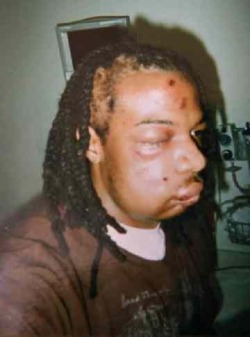Jury Selection to begin next week in Jordan Miles Case: Pittsburgh Police Beat Down Unarmed Black College Student, Lied about it
/ From [HERE] A federal judge has told attorneys to pare down their lists of potential witnesses in a civil lawsuit alleging that three white Pittsburgh police officers used excessive force against a Black college student two years ago. The judge also ruled that evidence on the backgrounds of plaintiff and officers can be introduced only for impeachment or rebuttal.
From [HERE] A federal judge has told attorneys to pare down their lists of potential witnesses in a civil lawsuit alleging that three white Pittsburgh police officers used excessive force against a Black college student two years ago. The judge also ruled that evidence on the backgrounds of plaintiff and officers can be introduced only for impeachment or rebuttal.
U.S. District Judge Gary Lancaster's statement came in a pretrial conference on the federal civil rights suit by 20-year-old Jordan Miles alleging physical and psychological injuries stemming from the 2010 arrest. He also contends the officers working a special anti-drug detail in a high-crime area approached him simply because he was a young black man and concocted claims he was acted suspiciously after things went awry. The officers say Miles resisted arrest and they used proper force.
The officers said they confronted Mr. Miles because he appeared to be "sneaking around" with a heavy object in his coat that they thought was a concealed weapon. When he was approached by the officers he ran away, but the officers soon caught up with him and beat him into submission by delivering violent blows that left his face swollen and distorted. Police also used a stun gun and pulled out a chunk of his hair. He is 5-foot-6 and 150 pounds and was unarmed. No weapons were found.
He has yet to rule on a plaintiff's motion to bar officers from saying they found and discarded a soda bottle that they thought was a weapon. Jury selection is scheduled to begin next week.
Jordan Miles, now 20, is a violist who was enrolled at the city's Creative and Performing Arts high school when he encountered the officers while walking near his home the night of Jan. 12, 2010. Miles denies having the soda bottle, much less a gun.
Among other things, the officers' attorneys want the judge to keep the jury from hearing that a district judge dismissed all criminal charges against Miles. They also want to keep the jury from hearing about any prior discipline the officers might have received.
Miles' attorneys, meanwhile, are trying to keep facts out of evidence including past school discipline and a statement from Miles' own friend, who said Miles told him he did have a soda bottle that night before the friend later recanted.
The police contend Miles was first seen near a home whose owner later told them she didn't know Miles and hadn't given him permission to be on or near her property. That would buttress the police version that Miles was acting suspiciously and they had a legitimate reason to approach him.
But a district judge threw out the charges against Miles after the homeowner, Monica Wooding, testified at a preliminary hearing in March 2010 that Miles is friends with her son, and said the police never asked her about whether he might have been trespassing.
If that weren't bad enough for officers Richard Ewing, Michael Saldutte and David Sisak, a police commander and the chief both gave sworn depositions critical of them, too.
A police procedures expert who will testify for Miles summarized Cmdr. Rashall Brackney's deposition this way: Ewing has been found to be untruthful in his police reports and "received counseling, training and discipline for report writing" and all three officers "had a history of lying and taking action when not rising to (a) level of reasonable suspicion."
The officers were assigned to unmarked vehicles with tinted windows that police use to make stops to prevent drug trafficking or violence before it can occur. Harper said in his deposition that he's not aware of any officers assigned to such vehicles "with as many complaints as the three involved officers," according to the expert.
The city has already paid $75,000 to settle Miles' claims against it.
Miles' attorneys, meanwhile, they don't want the jury to know Miles was suspended twice in middle school for fighting. His attorney, J. Kerrington Lewis, said Miles was never disciplined at the performing arts high school.
Lewis also doesn't want the jury to learn that Miles' friend told the FBI that Miles acknowledged having a soda bottle that night. The FBI took the statement while investigating possible civil rights violations the Justice Department declined to prosecute.
"I don't know why he told that to the FBI, but he recanted it," Lewis said. "But he did that on his own, for whatever reason."
Lewis also wants to keep the jury from hearing that police later found a magazine of bullets near the spot police approached Miles.
Lewis argues that's irrelevant because police never charged Miles with having a gun, and both sides agree police searching the snow-covered area that night found nothing. And no gun was ever found.
"He can't `act like he had a gun' and then not have one," Lewis scoffed.
"The story is a fraud and so is the clip" of bullets police are trying to tie to Miles, he said.
Because county prosecutors also passed on filing criminal charges against the officers, the civil rights trial set to begin July 16 will be the first and last legal word on what happened that night.





































































































































































































































































